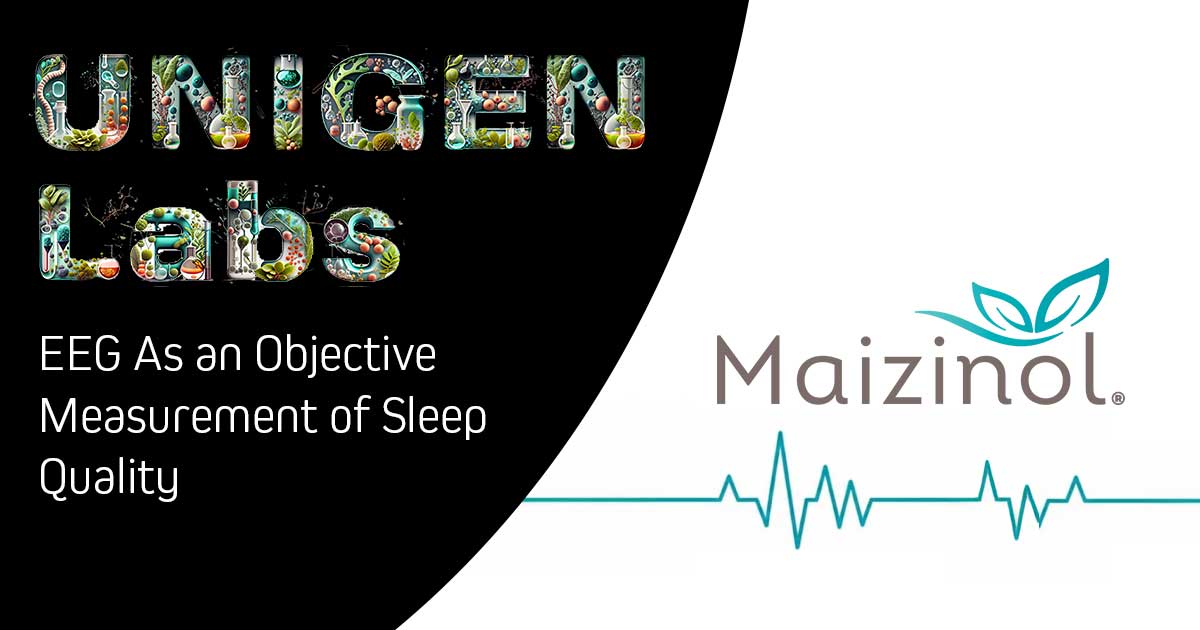KCG Science, Inc., a highly-regarded provider of high-quality clinical research trials, recently published an episode of their Orange Pill podcast that delves into the world of sleep. The episode reviews the sleep why sleep is critical to overall health, how and why melatonin is used, and the global demand for new effective sleep supplements, like Maizinol®.
Introduction (00:00)
Graham: Hey everyone, Graham Morgan here welcoming you back to the Deep Dive.
Dana: And I’m Dana Mahoney. Hello. Excited to be diving in once again.
Graham: Absolutely. We’re your hosts for the Orange Pill podcast.
Dana: And yeah, we’re really excited about what we’re digging into today.
Graham: Definitely ready to explore something pretty interesting.
Dana: So today we’re zeroing in on something specific. It’s a component found in corn leaves of all places. And it’s showing some serious potential for helping with sleep. Now we know you want the insights fast.
Dana: You don’t want to get bogged down. So that’s our mission. Valuable info. Nice and clear.
Graham: And it connects to something many of you probably already know a bit about. I mean, think about melatonin supplements. They’re pretty common these days, aren’t they? You see them in hospitals sometimes, definitely on pharmacy shelves, kind of a go-to if sleep’s being difficult.
Dana: Yeah, often the first stop for people looking for a little help drifting off.
Graham: Exactly.
Dana: And that kind of brings us to the bigger picture, doesn’t it? Sleep. We all know how vital good sleep is.
Graham: Oh, absolutely.
Dana: So it’s really no surprise there’s this, well, massive and rapidly growing market for things to help us sleep better. You’ve probably seen it yourself. So maybe let’s start with melatonin, since it’s such a well-known natural starting point.
About Melatonin (01:15)
Graham: Okay, yeah, let’s unpack that. So melatonin is a hormone. Our bodies make it naturally.
Dana: Right, the internal clock thing.
Graham: Exactly. It’s key for that sleep-wake cycle. It basically tells your body when it’s time to wind down based on light, you know, like nature’s dimmer switch.
Dana: Good analogy. And because of that direct link, melatonin supplements have become, well, super popular, especially if you have trouble falling asleep or staying asleep.
Graham: Right. And people often see it as maybe a gentler option compared to some older prescription meds.
Dana: Yeah, the ones that might have more side effects.
Graham: Precisely. That idea of fewer side effects is a big draw for national aides like melatonin. But, you know, it’s still important to remember that research is ongoing.
Dana: Always.
Graham: We need to fully grasp how they work for everyone, how effective they really are long term, and any potential downsides down the line.
Dana: Absolutely. And even with something seemingly mild like melatonin, it’s not always perfect, right? Like I’ve heard taking too much can sometimes.
Graham: So your stomach, yeah, that can happen, which is obviously the last thing you want when you’re trying to sleep.
Dana: Definitely not.
Sleep Market Overview (02:21)
Graham: So like any supplement, it’s about finding what works for you and being aware. Now, zooming out a bit, this interest in natural aids really feeds into the incredible growth of a whole sleep market.
Dana: Incredible growth? I bet the numbers are pretty big. What are we talking about?
Graham: Oh, the scale is something else. So for 2024, the global market for sleep supplements estimated around $7.6 billion US dollars.
Dana: Billion!
Graham: And it’s not stopping there. Projections show it could hit, like, 12.9 billion by 2034. That’s a growth rate of about 5.2% every year.
Dana: Okay, that’s huge.
Graham: And melatonin is definitely a big part of that number. But the main point is, people really want better sleep, and they’re putting serious money into finding solutions, especially natural ones.
Dana: That’s more than just growth. That’s a real surge. What’s behind it all. It can’t just be melatonin awareness.
Graham: No not at all. A big driver is this growing consumer preference for things they see as natural clean products and sleep aids are right in the middle of that trend. People are actively looking for healthier alternatives even for sleep.
Dana: That makes total sense. Feels like everyone’s way more conscious about what they’re putting in their bodies now.
Graham: Exactly.
Dana: And I guess the last few years, all the stress, disrupted routines, that probably hasn’t helped anyone’s sleep patterns much.
Graham: You hit the nail on the head. That increased stress may be linked to, you know, everything that’s been going on globally. It’s definitely fueled demand. And like you said, these natural options, they’re now competing head to head with traditional sleep meds.
Dana: It really feels like a shift, people exploring these maybe gentler routes first.
Graham: Absolutely. Plus, there’s just a better understanding now of how critical sleep is for, well, everything. Physical health, mental function.
Dana: Yeah, it affects everything.
Graham: I think of the aging population. Yeah. Older adults often face more sleep challenges. So the need for safe, effective options just keeps growing.
Dana: Makes sense. And where are people mostly finding these things. Seems like they’re everywhere.
Graham: Interestingly retail pharmacies are a major channel right now. Probably because so many are over the counter. Easy access.
Dana: Right. Convenience is key. So OK. Huge market. Lots of competition. People want natural. What are companies doing to stand out.
Graham: That’s the million-dollar question, isn’t it? Or maybe the billion-dollar one here. Mm-hmm. The key seems to be R&D, research and development.
Dana: Okay.
Graham: Companies are really pushing to find natural ingredients that work well for sleep but have, you know, minimal side effects. That’s the holy grail.
Dana: Fewer side effects, natural source. Yeah, I get it.
How Maizinol® Works (04:53)
Graham: And this brings us, actually, to the really fascinating focus of our chat today, an ingredient called Maizinol®.
Dana: Maizinol. OK, the name’s catchy. Tell us about it. What is it? Where is it from?
Graham: So Maizinol is this patented natural ingredient. It’s been clinically studied for sleep support. And the source is, well, it’s zia mays.
Dana: Zia mays?
Graham: Sounds familiar. It’s corn. Common corn. Specifically, the leaf.
Dana: Corn leaves? Seriously?
Graham: Yeah.
Dana: That’s unexpected for a sleep aid.
Graham: I know, right? But this specific extract, it has these proprietary standardized compounds. And the key thing is, they’ve been shown to bind to melatonin receptors in our body.
Dana: Oh, OK. Like docking stations for sleep signals.
Graham: Exactly. Think of it like that. Melatonin latches on and tells your body to sleep. These compounds in Maizinol seem to do something similar, maybe even grab onto one key receptor much tighter.
Dana: Tighter grip. Interesting.
Graham: Yeah. And this binding action leads to melatonin-like effects, aiming for better sleep quality overall.
Dana: OK, so it works kind of like melatonin, but what makes it different? Why not just take melatonin?
Scientific Validation: The Studies (06:00)
Graham: Good question. Several things stand out. First off, Maizinol itself. It’s hormone free.
Dana: OK, that’s a difference.
Graham: And clinical studies suggest it actually increases the amount of restorative sleep, deep sleep. That’s huge for feeling properly rested.
Dana: Deep sleep. Yeah, that’s the really good stuff. The part that makes you feel refreshed.
Graham: Totally. Plus, studies show it improves overall sleep quality too. They measure this using something called the PSQI-Pittsburgh Sleep Quality Index.
Dana: Ah, the questionnaire one.
Graham: Yeah, it assesses different aspects of your sleep. And Maizinol showed improvements there.
Dana: So better deep sleep, better overall quality. What about that tighter grip you mentioned?
Graham: Right. Scientifically, this is pretty interesting. The active compounds in Maizinol, they’ve shown a fourfold higher affinity for a specific melatonin receptor called MT2 compared to just regular melatonin.
Dana: Whoa, four times, that sounds significant.
Graham: It’s definitely noteworthy. A four-fold higher affinity could mean it binds more effectively, maybe leading to a stronger effect, potentially even at a lower dose, though more research always helps there.
Dana: OK, so potentially more bang for your buck at the receptor level.
Graham: That’s one way to think about it. Yeah. It suggests a more potent interaction with those key sleep regulating receptors.
Dana: Gotcha. Are there other benefits, like practical ones?
Graham: Yeah, there are. It’s designed for once a day use, apparently works well in formulations with other ingredients. And of course, the big one, it’s from a natural plant source with a history of safe consumption.
Dana: Corn. Yeah, pretty safe.
Graham: And it’s undergone extensive safety testing, showing no adverse effects. Plus, it’s patent protected.
Dana: So solid science and IP behind it, not just ground up leaves. Where do they get this specific corn leaf? Is it special corn?
Graham: Well, the company behind it, Unigen, they’ve done a lot of work identifying the right kind of corn. Maizinol comes from the leaves of young zia mays plants.
Dana: Young plants, okay.
Graham: And they’ve really optimized how they grow and harvest them. The goal is consistency, making sure they get a standardized amount of those active compounds every time.
Dana: Makes sense. You need reliability in a supplement. Now, you said it works in a few ways. How does it actually help with sleep beyond just the receptor binding?
Graham: Right. So researchers point to three main mechanisms. First, as we said, that direct binding to melatonin receptors.
Dana: Okay. Mechanism one.
Graham: Second, it seems to help lower levels of cortisol.
Dana: The stress hormone. Ah, that makes sense. High cortisol, bad sleep.
Graham: Exactly. Elevated cortisol can really mess with sleep. And third, it seems to play a role in regulating our body’s own melatonin production through a compound called 6-MBOA.
Dana: Wait, so it helps our body make its own melatonin, too?
Graham: It seems to influence those pathways, yes. So it’s not just adding something external. It’s also sort of nudging our natural systems.
Dana: That sounds quite comprehensive, actually. Binding, lowering stress hormones, and helping our own melatonin process.
Graham: Yeah, it appears to be multifaceted.
Dana: OK, that sounds impressive on paper. But what about the proof? You mentioned clinical studies. What did they find?
Graham: There’s some good published research, one study, a double-blind placebo-controlled one, which is a strong study design.
Dana: The gold standard, basically.
Graham: Pretty much. It was published in the Journal of Medicinal Food back in 2023, and it found Maizinol did increase total sleep time.
Dana: Okay.
Graham: And importantly, it increased deep sleep time, too. They measured this using fitness trackers the participants wore.
Dana: Ah, like Fitbits or something.
Graham: Exactly. And participants also reported better sleep quality using that PSQI questionnaire we mentioned. Yeah. Crucially, no serious side effects were reported.
Dana: Okay, that’s a solid start. Peer-reviewed, published data. But you mentioned a second study too.
Maizinol’s Second Study (09:39)
Graham: Yes. And this one’s really interesting because it used even more objective, sophisticated sleep measurement tools. This study was run by KGK Science, Inc.
Dana: KGK Science, got it.
Graham: And they use both Actigraphy and EEG devices.
Dana: OK, Actigraphy, that’s the wrist device tracking movement, right? Tells you about sleep duration, wait times.
Graham: You got it. Tracks wrist activity cycles. And EEG, of course, monitors brain waves. That gives incredibly detailed info on the actual sleep stages. Light sleep, deep sleep, REM.
Dana: EEG. Wow. Okay. So they were really getting into the nitty gritty of brain activity during sleep. A very detailed picture.
Graham: Exactly. This was a serious study. Randomized triple blind, placebo controlled again, top tier design. They had 80 healthy adults aged 18 to 65.
Dana: And these people had sleep issues.
Graham: Yes. They reported difficulty falling asleep or staying asleep. Half got 500 milligrams of Maizinol each day. The other half got a placebo for 28 days.
Dana: All right. The comparison. So what did this more detailed objective study share?
Graham: The results were pretty striking, actually. Statistically significant improvements for the Maizinol group across several key objective measures.
Dana: Like what?
Graham: OK, so they fell asleep faster. That’s reduced sleep latency. They woke up less during the night.
Dana: Fewer awakenings. Nice.
Graham: They spent less time awake after they first fell asleep. That’s what they saw. Yeah. Wake after sleep onset. Their overall sleep efficiency improved.
Dana: So more time in bed was actual sleep time.
Graham: Precisely. They also saw increases in both REM sleep and that crucial deep and REM sleep. Total sleep time went up. And interestingly, their overall sleep structure seemed to optimize.
Dana: Optimize sleep structure. What does that mean exactly?
Graham: Basically getting the right proportions of the different sleep stages through the night for healthy sleep. And importantly, all this happened without messing with their natural circadian rhythm, their internal body clock.
Dana: Wow. Okay. That is a comprehensive list of benefits. Falling sleep faster, staying asleep better, better quality sleep, more total sleep, and all measured objectively. That’s pretty compelling.
Graham: It really is. And these objective findings, they were backed up by what the participants themselves reported. They felt like they were sleeping better too.
Dana: The subjective feeling matched the objective data. That’s always good.
Graham: Absolutely. And the study reconfirmed that Maizinol was safe and well tolerated. No issues there.
Dana: That safety aspect is huge, especially comparing it to some prescriptions. Did the researchers running this second study share any key thoughts?
Graham: Yes. Dr. Erin D. Lewis, who’s the scientific director at KGK Science, she highlighted how important it is to use these gold standard methods like EEG to really understand how natural products affect something as complex as sleep.
Dana: Makes total sense. You need that hard data, not just anecdotes.
Graham: Right. And Dr. Qi Jia, the chief scientific officer over at Unigen, the company that makes Maizinol, he emphasized how this study provides solid scientific backing for a safe sleep support ingredient. And he also pointed out that using objective measures like this really sets a higher bar for the whole industry, which is good for consumers.
Dana: Raising the standard. That’s good to hear. Sounds like a real commitment to the science. Is this latest study going to be published so others can see the full details?
Graham: Yes, that’s the plan. KGK Science is submitting this trial for publication in a peer-reviewed journal. That’s a critical step, gets it out into the wider scientific community.
Wrap-up and Takeaways (12:58)
Dana: Excellent. Well, this has been incredibly informative. It’s really quite amazing, isn’t it? Thinking that something from a common corn leaf could potentially have such a detailed and positive impact on sleep.
Graham: It really is fascinating. It just underscores the potential still hiding in the natural world, solutions for everyday health things.
Dana: So just to kind of wrap up our deep dive today, we’ve looked at this specific component from corn leaves, Maizinol, and how clinical studies show it seems promising for improving sleep in various ways, acting on those melatonin receptors.
Graham: Right. And we talked about how a natural ingredient like this fits into that booming sleep aid market, offering another option for people looking for better rest, potentially with a good tolerance.
Dana: Which kind of leaves me with a final thought for you, our listeners. Thinking about this growing interest in natural stuff and the solid science emerging, what other maybe unexpected plants or natural compounds might be out there holding undiscovered benefits for us? Yeah. It really makes you think about that intersection of nature and careful science, finding answers to everyday health challenges.
Graham: That’s a great question to ponder. Thanks for joining us on this exploration.
Dana: Indeed. And a special thank you to KGK Science for sponsoring that second clinical study on Maizinol we discussed. Until next time on the Deep Dive, sleep well.
► Interested in learning more about Maizinol®? Discover the science on our Maizinol product page.



